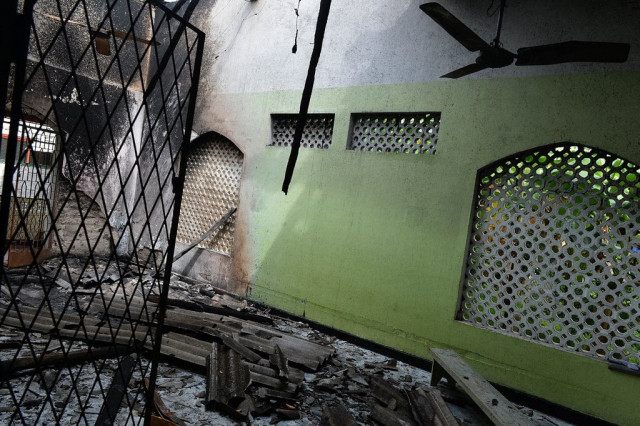Violence in Sri Lanka
Ethnic violence in Sri Lanka rapidly spirals out of control and can lead to thousands of deaths in a very short time.

The charred interior of a mosque is pictured following clashes between Muslims and an extremist Buddhist group in the town of Alutgama on June 16, 2014. PHOTO: AFP

Once again, it is far from easy to discern why the Muslim minority in Sri Lanka should be persecuted, but one possibility could be a growing perception that they have not assimilated into the majority culture fully. There does not appear to be any objective proof of this perception, but it is pervasive in both Sri Lanka and Myanmar (Burma).
Three people have now been killed and 52 injured as Buddhist monks rampaged through predominantly Muslim areas in southwest Sri Lanka. This follows a large rally on June 15, 2014 by Bodu Bala Sena after which there was violence by both sides, Muslim and Buddhist. Muslim homes and shops were burned and looted.
Sri Lanka is a volatile country and ethnic and religious tensions are always close to the surface. In the most recent outbreaks, the government of Mahinda Rajapaksa (currently out of the country at the G77 summit in Bolivia) urged the population via Twitter — rather than a press conference or press release — not to take the law into its own hands and urged all parties to act with restraint. It may be argued that the use of social media in this way is a convenient fig leaf, concealing the reality that the extremists of Bodu Bala Sena have the unspoken but tacit support of the government of the day.
The perceived threat presented by the Muslim minority that make up 9.7 per cent of the population as against 70.2 per cent who are Buddhist, has the capacity to spread across the island state. Bodu Bala Sena is strongly nationalist and the monks that are its shock troops willing to abandon their pacifist principles in defence of what they see as attempts by the Muslim minority to undermine both it and their political dominance of Sri Lankan politics. Again there is no supporting evidence for this supposition, and Fred Carver, campaign director of the UK-based Sri Lanka Campaign for Peace and Justice, has commented on his concerns that ethnic violence in Sri Lanka rapidly spirals out of control and can lead to thousands of deaths in a very short time.
Although the roots of the uptick in violence against the minority Muslim group in Sri Lanka may be obscure and disputed, what is very clear is that once again the world faces another situation where religious groups are at odds and no matter what their pacifist roots, the Faustian pact with governance (a situation with which the citizens of Pakistan are not unfamiliar) negates or overrides pacifism for a muscular and narrow nationalism. Imagined threats either to the status quo or the dominant faith or sect are artificially inflated; events are distorted or conflated to the detriment of the targeted minority and blood inevitably spilt. It is to be hoped that the government of Sri Lanka moves quickly to protect its Muslim minority before matters deteriorate further.
Published in The Express Tribune, June 19th, 2014.
Like Opinion & Editorial on Facebook, follow @ETOpEd on Twitter to receive all updates on all our daily pieces.














COMMENTS
Comments are moderated and generally will be posted if they are on-topic and not abusive.
For more information, please see our Comments FAQ